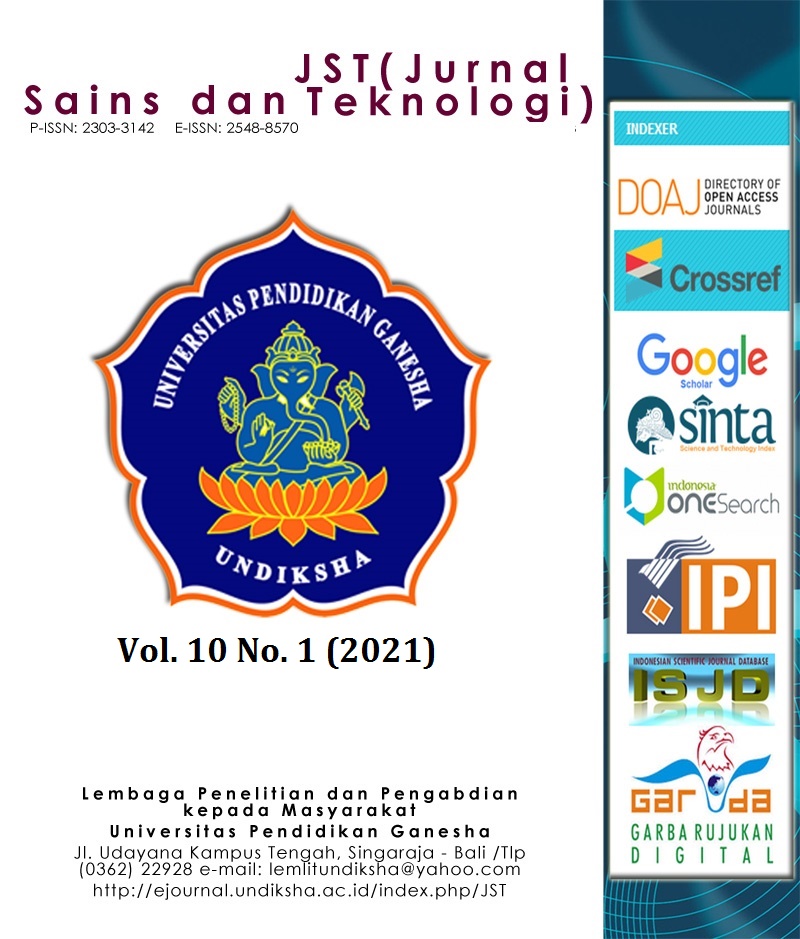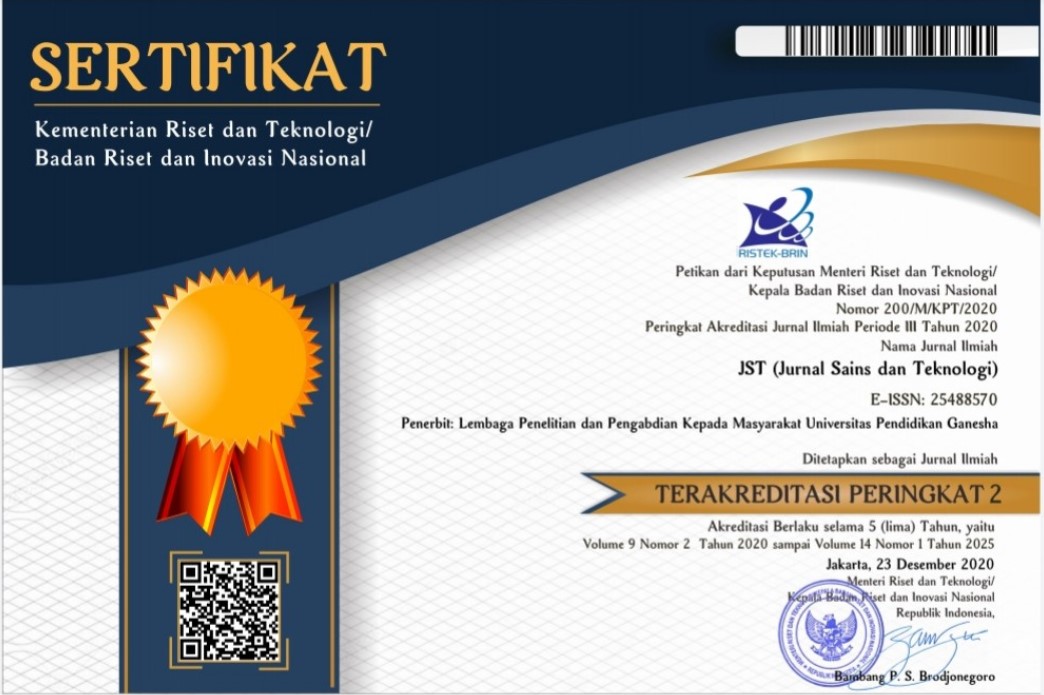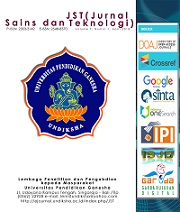ANALYSIS OF FATTY ACIDS IN VIRGIN COCONUT OIL FRYING AT VARIOUS TEMPERATURES
DOI:
https://doi.org/10.23887/jstundiksha.v10i1.34452Keywords:
virgin coconut oil, frying, oils, fatty acidsAbstract
Fatty acid content from virgin coconut oil (VCO) is a medium-chain triglyceride (MCT) group. MCT is stable at very low and high temperatures, and the color does not turn black due to the addition of heat so that it can be developed into beneficial cooking oil for health. Therefore, a study was conducted on the content of fatty acids in VCO after being heated at temperatures of 150, 200, and 250°C for 60 minutes. Analysis of fatty acid content in control VCO(T0), VCO with heating temperatures of 150oC(T1), 200oC(T2), and 250oC(T3) was performed with GCMS QP-2010 Ultra.The results showed that there were differences in levels and types of fatty acids in VCO by treating T0, T1, T2, and T3. At these three temperatures still produce medium-chain saturated fatty acids and trans fatty acids are not produced, so that VCO can be utilized as cooking oil that has better stability and benefits for health.References
Afaneh, I., Abbadi, J., Al-Rimawi, F., Al-Dabbas, G., & Sawalha, S. 2017. Effect of Frying Temperature and duration on the Formation of Trans Fatty Acids in Selected Fats and Oils "Effect of Frying Temperature and duration on the Formation of Trans Fatty Acids in Selected Fats and Oils. American Journal of Food Science and Technology, 5(6), 245–248. https://doi.org/10.12691/ajfst-5-6-4
Alzaa, D. F. 2018. Evaluation of Chemical and Physical Changes in Different Commercial Oils during Heating. 2(6), 02–11.
Asiah, N., Cempaka, L., & Maulidini, T. 2013. Comparative Study : Physico-Chemical Properties of Virgin Coconut Oil Using Various Culture. 6(2), 1–5.
Bazina, N., & He, J. 2018. Analysis of fatty acid profiles of free fatty acids generated in deep-frying process. Journal of Food Science and Technology, 55(8), 3085–3092. https://doi.org/10.1007/s13197-018-3232-9
Brühl, L. 2014. Fatty acid alterations in oils and fats during heating and frying. European Journal of Lipid Science and Technology, 116(6), 707–715. https://doi.org/10.1002/ejlt.201300273
Choe, E., & Min, D. B. 2007. Chemistry of Deep-Fat Frying Oils. Journal of Food Science, 72(5), R77–R86. https://doi.org/10.1111/j.1750-3841.2007.00352.x
Dayrit, F. M. 2014. Lauric Acid is a Medium-Chain Fatty Acid, Coconut Oil is a Medium-Chain Triglyceride. In Philippine Journal of Science (Vol. 143, Issue 2).
Lu, H., & Tan, F. S. 2009. A Comparative study of storage stability in virgin coconut oil and extra virgin Olive oil upon thermal treatment. In International Food Research Journal (Vol. 16).
Martin, C. A., Milinsk, M. C., Visentainer, J. V, Matsushita, M., & De-Souza, N. E. 2007. Trans fatty acid-forming processes in foods: a review. 79(2), 343–350. www.scielo.br/aabc
Mozaffarian, D., Aro, A., & Willett, W. C. 2009. Health effects of trans-fatty acids: Experimental and observational evidence. European Journal of Clinical Nutrition, 63, S5–S21. https://doi.org/10.1038/sj.ejcn.1602973
Omar, M. N., Nor-Hazwani, M. H., Nazreen, M. N. M., & Zuberdi, A. M. 2014. Studies on frying quality of virgin coconut oil and shortening blends. Oriental Journal of Chemistry, 30(3), 1279–1286. https://doi.org/10.13005/ojc/300344
Sahin, S. 2019. Evaluation of Stability against Oxidation in Edible Fats and Oils. Journal of Food Science and Nutrition Research, 02(03), 283–298. https://doi.org/10.26502/jfsnr.2642-11000027
Sartika, R. A. D. 2008. Pengaruh Asam Lemak Jenuh, Tidak Jenuh dan Asam Lemak Trans terhadap Kesehatan. Kesmas: National Public Health Journal, 2(4), 154. https://doi.org/10.21109/kesmas.v2i4.258
Sharoba, A. M., & Fawzy Ramadan, M. 2012. Impact of Frying on Fatty Acid Profile and Rheological Behaviour of Some. https://doi.org/10.4172/2157-7110.1000161
Song, J., Park, J., Jung, J., Lee, C., Gim, S. Y., Ka, H., Yi, B., Kim, M.-J., Kim, C.-I., & Lee, J. 2015. Analysis of Trans Fat in Edible Oils with Cooking Process. Toxicol. Res, 31(3), 307–312. https://doi.org/10.5487/TR.2015.31.3.307
Tarmizi, A. H. A., Ismail, R., & Kuntom, A. 2016. Effect of frying on the palm oil quality attributes-A review. In Journal of Oil Palm Research (Vol. 28, Issue 2, pp. 143–153). Lembaga Minyak Sawit Malaysia. https://doi.org/10.21894/jopr.2016.2802.01
Tian, X. 2013. Chemical Factors Affecting Degradation Processes Of Vegetable Oils During Frying. https://doi.org/https://doi.org/doi:10.7282/T39S1P2C
Downloads
Published
How to Cite
Issue
Section
License
Authors who publish with the Jurnal Sains dan Teknologi (JST) agree to the following terms:
- Authors retain copyright and grant the journal the right of first publication with the work simultaneously licensed under a Creative Commons Attribution License (CC BY-SA 4.0) that allows others to share the work with an acknowledgment of the work's authorship and initial publication in this journal.
- Authors are able to enter into separate, additional contractual arrangements for the non-exclusive distribution of the journal's published version of the work (e.g., post it to an institutional repository or publish it in a book), with an acknowledgment of its initial publication in this journal.
- Authors are permitted and encouraged to post their work online (e.g., in institutional repositories or on their website) prior to and during the submission process, as it can lead to productive exchanges, as well as earlier and greater citation of published work. (See The Effect of Open Access)
















